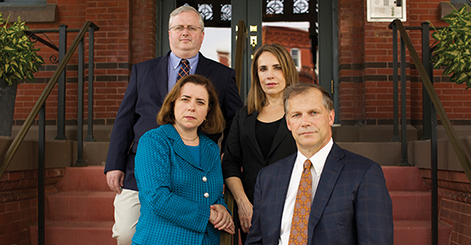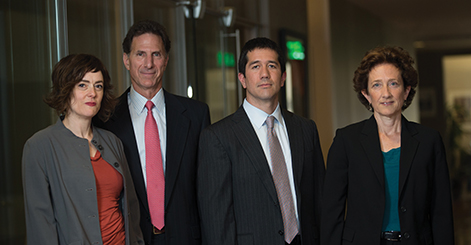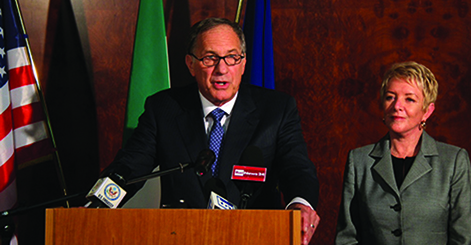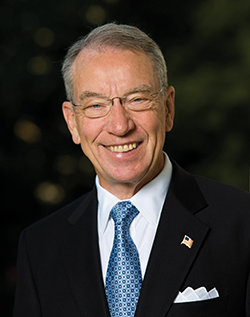The Giant Killers: The Whistleblower Lawyers of Phillips & Cohen
By Jeffrey Anderson | September 21, 2014 | News & Features

Washington, D.C.-based partners Timothy McCormack, Colette Matzzie, Erika Kelton and Peter Chatfield (Photo by Eli Meir Kaplan).
Magazine Feature: Facing possible job loss, isolation and unimaginable stress, whistleblowers need courage. They also need the right help: Lawyers with skills, resources and tenacity who possess the ability to become good friends and listeners while keeping their eyes on the higher purpose of corporate reform. Enter Phillips & Cohen.
(VIEW THE FULL ARTICLE "THE GIANT KILLERS" IN PDF FORMAT.)
For anyone who has toiled in Corporate America, or read horror stories about it, the story is a familiar one. Employee A lands a job at, say, a large pharmaceutical company, and becomes established with access to proprietary information. He feels good about the job he is doing, but one day he stumbles across some questionable business activity that gives him pause.
He takes his concerns to his boss, and the response seems mean, but it is the kindest thing he will hear from that day forward: “Shut up and do your job.”
The employee, his pride and righteousness bruised, then takes his concerns about, say, false drug labeling, to a corporate compliance officer, who praises him and leads him into a senior executive’s suite.
The executive, too, praises the employee, and says that it’s people like him upon whom success is built.
That’s on a Monday.
On Tuesday, Wednesday and Thursday, there are a flurry of meetings, but Employee A is not invited to any of them. Meanwhile, behind the scenes, the company opens up a personnel file on him and begins to poke around in his personal life, looking for signs of vulnerability: a messy divorce, a drinking problem, a slew of bad debt.
By Friday, the company is pretty sure that, one way or another, they are going to fire him.
Sensing over the next several days or weeks that he has fallen out of favor, the employee starts to copy documents related to the activity he has stumbled across, and maybe even loads up a thumb drive and takes it home with him.
When one day he finally is told to turn in his key fob and is walked out of the building by an HR director – perhaps accompanied by a security guard – it dawns on him that his world is collapsing. He is humiliated and about to become jobless. Somewhere deep inside he is angry. He vows to seek revenge.
He decides to become a whistleblower.
At that juncture, the smartest thing former Employee A can do, according to Patrick Burns, co-director of Taxpayers Against Fraud, a nonprofit organization founded in 1986 to promote and protect the False Claims Act, is to call him. He will then assess the scenario – and the mettle of Employee A – and help the whistleblower locate some heavy hitters in the legal world who will file a lawsuit in federal court.
Burns narrates this typically dark tale with zeal on a steamy summer day in Washington, D.C., at a coffee shop around the corner from an ornate federalist-style building that houses a boutique law firm responsible for some of the largest False Claims Act settlements in U.S. history.
He looks like a smaller version of Curly from the Three Stooges, but he is deadly serious about the realities of taking on a behemoth.
“Corporate defendants rely on two things: fear, and the complexity of the fraud,” says Burns. The going can get rough, he cautions. “It’s like oats going through a horse: You’ll never be better, but you might be richer,” he says, reeling off anecdotes about whistleblowers who went up against aerospace and pharmaceutical companies, ordinary employees “who went in whole, and came out whole, but for 10 years in between were crying.”
Burns is not suggesting that whistleblowers are or should be motivated solely by money. “Money and change,” he clarifies. “It’s what we want to leave our kids. It’s the world we want to live in. It’s the question we ask ourselves. Are we doing any good?”
Before any good is to come from an act of conscience or good, old-fashioned vengeance, however, Employee A needs a seasoned professional who can lead him through a minefield of legal challenges, mental doubts and tests of will. He needs a high quality lawyer – and expert mechanic, in Burns’ parlance – who can diagnose a case, plot a course for dealing with it, and not only prevail but force the culprit to pay for the costs of those who exposed its sins.
That’s where Phillips & Cohen comes in.
Erika Kelton walks into the conference room of the ornate federalist building, around the corner from Burns’ office, just off Dupont Circle, to talk about Phillips & Cohen and her approach to hunting big game. Her poise and authoritative presence suggest that she has been on a roll, and for no short period of time.
Kelton is a national leader in whistleblower, or qui tam, cases filed under the False Claims Act and state false-claims laws, as well as whistleblower cases under federal provisions relating to the Internal Revenue Service, Securities & Exchange Commission and Commodities and Futures Trading Commission. A graduate of the University of California at Berkeley, Boalt Hall School of Law, where she wrote for the Law Review, she regularly writes op-eds and letters to the editors of various publications,
contributes to SEC, IRS & CFTC rule-making processes that reward whistleblowers and speaks at conferences in the U.S. and abroad.
She also serves on the board of the Taxpayers Against Fraud Education Fund, which was founded in 2005 to further educate the public about the False Claims Act. (Phillips & Cohen is a donor.)
She is as heavy a hitter as there is. Both Kelton and fellow partner Colette Matzzie are members of the Lawdragon 500 Leading Lawyers in America.
Kelton sits down and describes an endless amount of fraud in the healthcare, defense and telecommunication industries that has already netted billions of dollars in settlements for whistleblowers and the U.S. government that “never ceases to amaze me.”
Yet, “the deterrent effect is profound,” she says, noting significant changes in the marketing of pharmaceuticals, to name just one area of change that has resulted from her firm’s successful litigation.
The list of Phillips & Cohen’s takedowns is long, punctuated by a leading role in the record-setting $3 billion settlement with GlaxoSmithKline in 2012 for improper marketing practices and financial inducements to doctors to prescribe and promote drugs such as Advair, Wellbutrin and Lamictal for off-label, unapproved uses, and a $1.8 billion settlement with Pfizer Inc. in 2009 for illegally marketing painkillers.
But as impressive as the corporate scalps on her wall is Kelton’s mastery of the art of relating to, protecting and guiding the whistleblower. “They are all sorts of different human beings,” she says. “Their personalities are all different. Most have tried other means and have been frustrated. I might be the first person who has taken them seriously. They may have lost their jobs. They want to correct wrongdoing. They are incredibly admirable and courageous. Many will be friends for life.”
Not surprisingly, Kelton is fiercely loyal to her clients and defends their motivations and honor. “Opportunism is not rewarded,” she says, deflecting any suggestion of a jackpot mentality. “This is very risky business. There are no sure bets. Most awards are not necessarily life-changing.”
One whistleblower’s life who has changed as a result of his association with Kelton is former GSK employee Matthew Burke.
“I have so much admiration for her,” Burke says of Kelton. “What I find so impressive about her is that it’s about justice, and doing the right thing. It’s about fair play.”

Mary Louise Cohen, one of the firm’s founding name partners, says that Kelton embodies the firm’s brand in that she “sees the forest,” pointing to her “entrepreneurial instinct” and “foresight” as her key leadership qualities. “Plus she’s a fabulous writer,” Cohen adds.
Burke and Kelton got to know each other well: The Glaxo case went on for approximately 10 years. And not only did Burke emerge victorious, he appears relatively unscathed.
Burke describes himself as a competitive guy from a large family who grew up playing high school and college baseball. He worked at Procter & Gamble until moving over to Glaxo, where he started in sales and marketing, eventually becoming a regional vice president of sales.
Eventually he became aware of what he describes as “immoral and illegal things” that reminded him of the lurid tales at the center of “a John Grisham novel.”
According to Burke, one of his sales reps had observed a physician speak on a number of occasions about off-label uses for the drug Wellbutrin, which accounted for $2 billion in sales at the time. She conveyed this in an email to her manager, who shared the information with Burke, who also shared the information with Glaxo employees.
Burke soon found himself in a crossfire: “There were 20 off-label claims that were replete with concerns, and at the same time the [Food and Drug Administration] was investigating both Wellbutrin and the speaker at the program.”
Burke was fired, he says, simply for forwarding the email.
“I began looking into the marketing of the product,” says Burke. “I was motivated by the fact that I had been bullied, and the fact that GSK was marketing products that were improper and dangerous.”
He reached out to Phillips & Cohen after a friend informed him of the firm’s success in bringing whistleblower cases. “I knew that most of the time it doesn’t work out well for whistleblowers even when they effect change,” he says, “but my engagement with them was so positive.”
Burke attributes his experience to Kelton’s deft handling of the matter, which included the help of another whistleblower from Glaxo, he says. “I consider her a friend. We took on Goliath together. She managed our expectations, respected our intelligence, and treated us as partners in the process.”
He also sees the way his employer handled the matter as a key to his decision. “They offered me a separation agreement and $140,000,” he says. “They said, ‘Matt, just take the money, you’ll get another job.’ It was arrogant and dumb on their part.”
Once committed to a whistleblower lawsuit, finding the lawyer with the raw skills was only part of the equation for Burke. “You have to have someone who cares for people, because they often have to manage difficulty in their lives. Erika was always there to remind me of the higher purpose of what we were doing.”
He says he had doubts that his case would be successful, and that he never considered the thought that it would play a lead role in the historic $3 billion settlement. (Phillips & Cohen’s case along with a separate case in Colorado accounted for more than $1 billion of the civil settlement and $767 million of the criminal settlement paid by Glaxo.)
“I knew I could be blackballed, and I knew that just because you are right doesn’t mean that you’ll win,” he says. “But I got punched in the face, and I wanted to punch back.”
Matthew Burke is perhaps the archetype that John Phillips had in mind for the core clientele that would drive his law practice for decades. Now the U.S. Ambassador to Italy, Phillips was an idealistic young lawyer in the late 1970s when he first got a taste of the power of legislative politics. The National Rifle Association had a stranglehold on elected officials and John Lennon had been assassinated, in 1980, when Phillips took a sabbatical to campaign for a gun law in California that was destined to fail.
Returning to his law practice after a three-year campaign, Phillips found himself wondering how to finance his representation of clients who were seeking to hold corporations accountable for their fraudulent acts. In conducting legal research he came across a dormant statute enacted under President Abraham Lincoln and saw that it contained a unique provision: A private citizen could stand in the shoes of an attorney general, pursue litigation against corporations and be entitled to a portion of any money damages generated by the case.

The law had been restrictively narrowed to the point of irrelevance, and Phillips thought, “This could be a tremendous tool in going after fraud in the defense procurement industry,” he says by phone from Italy. Then-U.S. Rep. Howard Berman, a California Democrat, had sponsored a private attorney general statute that contained a fee shifting provision, so Phillips approached him about reviving the so-called Lincoln Law that had been mothballed for years. With the help of Sen. Charles Grassley, Republican from Iowa, they passed the False Claims Act, in 1986. Phillips also founded Taxpayers Against Fraud that same year, knowing that the law would need protection.
Phillips says the process of educating the public about the power of the FCA was a long one. A feature story in the Los Angeles Times caught the attention of a doctor in La Jolla who helped expose health care fraud, and then another provider who worked for a blood lab helped expose the over-billing of Medicare, the latter netting $100 million. That was in 1992 and 1993, he says, in the context of a multibillion-dollar healthcare industry rife with misconduct. The president of the blood lab eventually went to prison, Phillips says.
“The FCA is the good news, but the risks [for whistleblowers] are huge,” he says. “They get blackballed. They become isolated. They get fired. They lose their home. They get divorced, or depressed. I’ve had some die.”
A key to success in specializing in False Claims Act cases is to “filter out crazies and conspiracy theorists,” according to Phillips. “Who has the documents and who doesn’t? The last thing you want to do is bring a case with an unstable client. Even if the case is good, if the client is unstable, you don’t take it. Others are solid. They are doing it for the right reasons. But even if they are doing it for the wrong reasons, if the case is strong and the law works in your favor, you still bring the case.”
Another major factor is the government’s involvement, says Phillips. Once a whistleblower, or qui tam, case is filed under the False Claims Act, it gets disclosed to the Department of Justice and remains under seal for 60 days while federal investigators vet the allegations and decide whether to join in the case as an “intervenor,” according to the Department of Justice website. Federal involvement is generally considered to improve the chances of success and can lead to a parallel criminal investigation.
At the end of the 60 days the government joins the case, declines or moves to dismiss it. Sometimes the government settles with the defendant upfront or advises the whistleblower that it intends to decline intervention, which usually is a sign that the case will be dismissed.
The act provides for triple damages and penalties up to $11,000 per claim. Ordinarily the successful whistleblower is entitled to 25-30 percent of the recovery, unless the government joins the case, which lowers the whistleblower’s cut to 15-25 percent. Either way, the corporate culprit pays Phillips & Cohen’s legal fees.
Phillips’ fellow founding partner, Cohen, says there are three basic categories of lawyers that do what P & C does: drive-by lawyers, showboat lawyers and serious lawyers. “The Justice Department knows that we play by the rules, we won’t breach a court seal and we don’t make unfounded allegations. We don’t ask them to do our work for us,” she says.
The Justice Department intervenes in fewer than 25 percent of qui tam cases, and the potential for eye-popping settlements is the biggest lever Phillips & Cohen has in getting the feds on board, Phillips says, pointing to a $130 million settlement that Kelton negotiated in a case the government declined to join. “Now [the Justice Department] turns down less cases so they don’t have to answer to Congress,” says Phillips. “The flip side is that they complain that it makes them bring cases that are less certain.”
From the government’s point of view, the potential for qui tam cases to result in successful parallel prosecutions also was a turning point in the evolution of the False Claims Act, according to Eric Havian, a former assistant U.S. attorney in the Northern District of California from 1987 to 1994. “Then I saw John Phillips on television after one of those enormous settlements and the light bulb went on,” says Havian, now a partner in Phillips & Cohen’s San Francisco office. “I thought, you know, this is what we should go and do. And I knew this guy, and thought maybe he’d toss us a few cases to get us started.”
Havian says that since then he has seen a couple of trends emerge. The first was in the aerospace industry, as Lockheed Martin, Northrop Grumman and TRW all got knocked down for fraudulent practices. “They wrote some very large checks to the government and got some very bad press,” he says. “I’m not going to say they cleaned up their act, but they’ve made progress. They are involved in far fewer cases, and I attribute that to the False Claims Act.” (According to Phillips, the rise of corporate compliance departments is another a direct result of the act’s success.)
In the 1990s, a different trend emerged in the healthcare industry, according to Havian. “They’re going through what looks like a longer learning curve,” he says. “When [big pharmaceutical companies] started getting hit, it seems like they doubled down and proceeded to get hit harder. There still seems to be a part of that industry that wants to battle. I’m not sure if they are as bright as the aerospace industry, but it does seem to take them longer to adjust their practices.”
From Havian’s perspective, it’s the Justice Department that should be doubling down, because even as the act has only increased pressure for corporations to reform their practices, the threat of liability can become a mere cost of doing business if the profit motive is high enough. In the health care arena, he suggests, exclusion from Medicare and threat of culpability for senior executives are avenues that could be attitude adjusters. “It doesn’t make sense to not be more aggressive,” he says. “True, there are limited resources, and some prosecutors are not as hardworking as they should be, but if you are ambitious, the way to make a name for yourself is by going after the big fish.”
The big fish, however, have in some instances ramped up their retaliation tactics, Havian says. In the Glaxo case, for example, Matthew Burke simply got fired. But in other cases, the corporation in question has gone after the whistleblower in court for allegedly stealing documents. “There’s less tolerance for dissenters who stand up and say, ‘this isn’t right.’ We’re seeing more cases than ever yet whistleblowers get treated worse and worse. With children, you punish the hell out of them in hopes that they’ll stop what they’re doing. That doesn’t work with whistleblowers. You slap them down and they get angry, then they are determined to cross the line and they show up in our office. It certainly keeps us in business.”
The sign on the suite in the Hart Senate Office Building reads Sen. Chuck – not Charles – Grassley, and on this June day a parade of school kids and civic association members is coming and going at regular intervals. Eventually, Grassley takes a break from meeting with constituents to talk with Lawdragon about whistleblowers, corporations and Congress. As one of the authors of the False Claims Act, he has enough of a bird’s-eye view of the history of the law to be frustrated with the politics that go along with it. As an Iowa farmer, he also demonstrates a plainspoken crabbiness and little patience for people who can’t get common sense through their thick skulls.

“You’re here to talk about the False Claims Act?” he says in a louder-than-necessary speaking voice. “I’m happy to talk about it because this legislation has been under attack since the day it was passed. We passed it in 1986 and it wasn’t even used that much until 1991.”
Grassley recalls being bothered by fraud, waste and abuse in the defense industry when he spearheaded the act, and it’s that very same industry that has “tried to neuter it” ever since, he says. “I was trying to do oversight of the Department of Defense,” he says, “I was looking to save the taxpayer money, but I was having all kinds of trouble getting contacts with people on the inside who you might call whistleblowers, or reformers. They found someone like me encouraging, and they started coming to me.”
Eschewing the specifics of legislative history, Grassley relates how he and Phillips became acquainted via a staff member in the mid-1980s, which led to the genesis of the act. “We were fighting DOD and senators who were putting a hold on it,” he recalls, “and [Senator] Jesse Helms had a hold on the bill in his committee. Now you’d have thought that’d be the end of it, but I went to Jess and talked with him about it and he said, ‘You know, that’s not a bad idea.’”
Over the years, Grassley complains, court interpretations have undermined the law, and that makes him unhappy. “Maybe they didn’t understand it,” he says, leaning in close, poking his finger in a reporter’s thigh to make his point: “Do you know it’s brought $40 billion into the U.S. Treasury? Should you have to defend that? You wouldn’t think you’d have to.”
Deterrence has an even greater value, Grassley continues: “You got faceless people in the bureaucracy, you see, and maybe they’re thinking they want to defraud the government. But now maybe they’re thinking twice. So how do you measure that? You can’t measure that, ya know.”
Aside from Congress and the corporations themselves, Grassley has choice words for the Justice Department for what he sees as an overly deliberate approach to intervening in whistleblower cases. “In the past, [the department] just thought about you as a private citizen filing a qui
tam action, but now they see it as, ‘Hey, this is making it look like we ain’t doing our job,’ so they may have accepted it more. They seem to be getting the feeling that they want to be a part of it. But not right away. No. They take their time and it’s slow, and it keeps the [whistleblower] from moving ahead. They oughta” – and here he pauses to glance at a staffer who gives him a nod – “do the job or get off the pot.”
No fan of lawyers in any context, Grassley reserves any sense of approval in this whole equation for the whistleblowers themselves – but in his typically blunt, unsentimental manner. “Most of ‘em get hurt professionally, ya know? They get treated like the skunk at the picnic,” he says, before heading off to greet another group from some Chamber of Commerce or another.
For Patrick Burns, it’s visionaries like Chuck Grassley and John Phillips, and expert legal “mechanics” like Erika Kelton and Eric Havian, who’ve made it possible for courageous figures like Matt Burke to hold Corporate America accountable for its fraudulent behavior. “You do good, you get good,” he says. “That’s true for Phillips & Cohen, and it’s true for successful whistleblowers. They’ve recovered billions of dollars for the taxpayers. They’ve changed corporate culture. And they’ve made millions for themselves on the backs of liars, cheats and thieves.”

